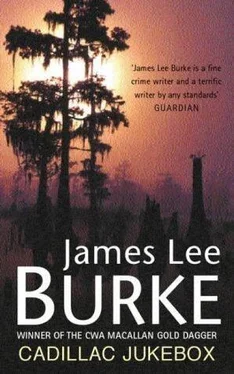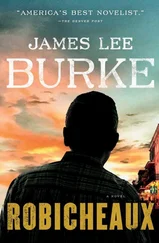James Burke - Cadillac Jukebox
Здесь есть возможность читать онлайн «James Burke - Cadillac Jukebox» весь текст электронной книги совершенно бесплатно (целиком полную версию без сокращений). В некоторых случаях можно слушать аудио, скачать через торрент в формате fb2 и присутствует краткое содержание. Жанр: Триллер, на английском языке. Описание произведения, (предисловие) а так же отзывы посетителей доступны на портале библиотеки ЛибКат.
- Название:Cadillac Jukebox
- Автор:
- Жанр:
- Год:неизвестен
- ISBN:нет данных
- Рейтинг книги:5 / 5. Голосов: 1
-
Избранное:Добавить в избранное
- Отзывы:
-
Ваша оценка:
- 100
- 1
- 2
- 3
- 4
- 5
Cadillac Jukebox: краткое содержание, описание и аннотация
Предлагаем к чтению аннотацию, описание, краткое содержание или предисловие (зависит от того, что написал сам автор книги «Cadillac Jukebox»). Если вы не нашли необходимую информацию о книге — напишите в комментариях, мы постараемся отыскать её.
Cadillac Jukebox — читать онлайн бесплатно полную книгу (весь текст) целиком
Ниже представлен текст книги, разбитый по страницам. Система сохранения места последней прочитанной страницы, позволяет с удобством читать онлайн бесплатно книгу «Cadillac Jukebox», без необходимости каждый раз заново искать на чём Вы остановились. Поставьте закладку, и сможете в любой момент перейти на страницу, на которой закончили чтение.
Интервал:
Закладка:
Helen walked up on the wood bridge that spanned the canal, rubbed her shoe on one unrailed edge, and walked back down on the levee again. The front tires of the submerged car, which lay upside down, broke through a tangle of dead hyacinths.
The man who had seen the accident sat on the levee with his wife at his side. He wore a greasy cap, with the bill pulled low over his eyes.
"Go through it again," I said.
He had to crane his head upward, into the sunlight, when he spoke.
"It was dark. I was walking back to the camp from that landing yonder. There wasn't no moon. I didn't see everything real good," he replied. His wife looked at the steel cable straining against the automobile's weight, her face vaguely ashamed, the muscles collapsed.
"Yes, you did," I said.
"He fishtailed off the levee when he hit the bridge, and the car went in. The headlights was on, way down at the bottom of the canal."
"Then what happened?" I asked.
He flexed his lips back on his teeth, as though he were dealing with a profound idea.
"The man floated up in the headlights. Then he come up the levee, right up to the hard road where I was at. He was all wet and walking fast." He turned his face out of the sunlight again, retreated back into the shade of his cap.
I tapped the edge of my shoe against his buttock.
"You didn't report an accident. If we find anything in that car we shouldn't, you'd better be in our good graces. You with me on this?" I said.
His wife, who wore a print-cotton dress that bagged on her wide shoulders, whispered close to his face while her hand tried to find his.
"He tole me to forget what I seen," the man said. "He put his mout' right up against mine when he said it. He grabbed me. In a private place, real hard." The flush on the back of his neck spread into his hairline.
"What did he look like?" Helen said.
"He was a white man, that's all I know. He'd been drinking whiskey. I could smell it on his mout'. I ain't seen him good 'cause the moon was down."
"You see that power pole there? There's a light on it. It comes on every night," I said.
The diver walked out of the shallows next to the overturned Lincoln as the winch slid it up on the mud bank. All the windows were closed, and the interior was filled from the roof to the floor with brown water. Then, through the passenger's side, we saw a brief pink-white flash against the glass, like a molting fish brushing against the side of a dirty aquarium.
The diver tried to open the door, but it was wedged into the mud. He got a two-handed ball peen hammer, with a head the size of a brick, and smashed in the passenger window.
The water burst through the folded glass, peppering the levee with crawfish, leeches, a nest of ribbon-thin cottonmouths that danced in the grass as though their backs were broken. But those were not the images that defined the moment.
A woman's hand, then arm, extended itself in the rushing stream, as though the person belted to the seat inside were pointing casually to an object in the grass. The fingers were ringed with costume jewelry, the nails painted with purple polish, the skin eaten by a disease that had robbed the tissue of its color.
I squatted down next to the man who had seen the accident and extended my business card on two fingers.
"He didn't try to pull her out. He didn't call for help. He let her drown, alone in the darkness. Don't let him get away with this, podna," I said.
Clete called the bait shop Saturday morning, just as I was laying out a tray of chickens and links on the pit for our midday fishermen.
"You got a boat for rent?" he asked.
"Sure."
"Can you rent the guy with me some gear?"
"I have a rod he can borrow."
"It's a fine day for it, all right."
"Where are you?"
"Right up the road at the little grocery store. The guy's sitting out in my car. But he doesn't like to go where he's not invited, know what I'm saying, Dave? You want Mingo? Anytime I got to run down a skip, all I got to do is talk to the guy in my car. In this case, he feels a personal responsibility. Plus, y'all go back, right?"
"Clete, you didn't bring Jerry Joe Plumb here?" I said.
He was notorious by the time he was expelled from high school his senior year-a kid who'd grin just before he hit you, a bouree player who won high stakes from grown men at the saloon downtown, the best dancer in three parishes, the hustler who cast aluminum replicas of brass knuckles in the metal shop foundry and sold them for one dollar apiece with the ragged edges unbuffed so they could stencil daisy chains of red flowers on an adversary's face.
But all that happened after Jerry Joe's mother died his sophomore year. My memory was of a different boy, from a different, earlier time.
In elementary school we heard his father had been killed at Wake Island, but no one was really sure. Jerry Joe was one of those boys who came to town and left, entered and withdrew from school as his mother found work wherever she could. They used to live in a shack on the edge of a brickyard in Lafayette, then for several years in a trailer behind a welding shop south of New Iberia. On Sundays and the first Fridays of the month we would see him and his mother walking long distances to church, in both freezing weather and on one-hundred-degree afternoons. She was a pale woman, with a pinched and fearful light in her face, and she made him walk on the inside, as though the passing traffic were about to bolt across the curb and kill them both.
For a time his mother and mine worked together in a laundry, and Jerry Joe would come home from school with me and play until my mother and his came down the dirt road in my father's lopsided pickup. We owned a hand-crank phonograph, and Jerry Joe would root in a dusty pile of 78's and pull out the old scratched recordings of the Hackberry Ramblers and Iry LeJeune and listen to them over and over again, dancing with himself, smiling elfishly, his shoulders and arms cocked like a miniature prizefighter's.
One day after New Year's my father came back unexpectedly from offshore, where he worked as a derrick man, up on the monkey board, high above the drilling platform and the long roll of the Gulf. He'd been fired after arguing with the driller, and as he always did when he lost his job, he'd spent his drag-up check on presents for us and whiskey at Provost's Bar, as though new opportunity and prosperity were just around the corner.
But Jerry Joe had never seen my father before and wasn't ready for him. My father stood silhouetted in the doorway, huge, grinning, irreverent, a man who fought in bars for fun, the black hair on his chest bursting out of the two flannel shirts he wore.
"You dance pretty good. But you too skinny, you. We gone have to fatten you up. Y'all come see what I brung," he said.
At the kitchen table, he began unloading a canvas drawstring bag that was filled with smoked ducks, pickled okra and green tomatoes, a fruit cake, strawberry preserves, a jar of cracklings, and bottle after long-necked bottle of Jax beer.
"Your mama work at that laundry, too?… Then that's why you ain't eating right. You tell your mama like I tell his, the man own that place so tight he squeak when he walk," my father said. "Don't be looking at me like that, Davie. That man don't hire white people lessen he can treat them just like he do his colored."
Jerry Joe went back in the living room and sat in a stuffed chair by himself for a long time. The pecan trees by the house clattered with ice in the failing light. Then he came back in the kitchen and told us he was sick. My father put a jar of preserves and two smoked ducks in a paper bag for him and stuck it under his arm and we drove him home in the dark.
That night I couldn't find the hand crank to the phonograph, but I thought Jerry Joe had simply misplaced it. The next day I had an early lesson about the nature of buried anger and hurt pride in a child who had no one in whom he could confide. When the school bus stopped on the rock road where Jerry Joe lived, I saw a torn paper bag by the ditch, the dog-chewed remains of the smoked ducks, the strawberry preserves congealed on the edges of the shattered Mason jar.
Читать дальшеИнтервал:
Закладка:
Похожие книги на «Cadillac Jukebox»
Представляем Вашему вниманию похожие книги на «Cadillac Jukebox» списком для выбора. Мы отобрали схожую по названию и смыслу литературу в надежде предоставить читателям больше вариантов отыскать новые, интересные, ещё непрочитанные произведения.
Обсуждение, отзывы о книге «Cadillac Jukebox» и просто собственные мнения читателей. Оставьте ваши комментарии, напишите, что Вы думаете о произведении, его смысле или главных героях. Укажите что конкретно понравилось, а что нет, и почему Вы так считаете.












